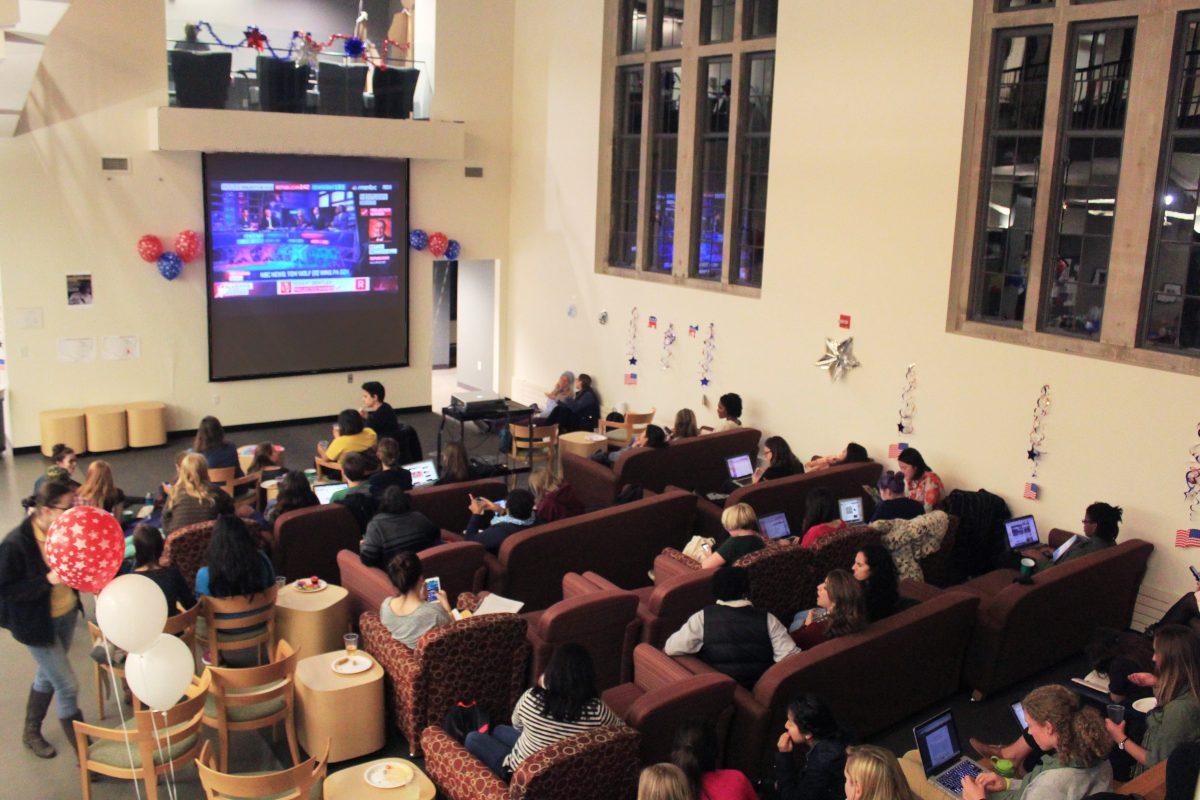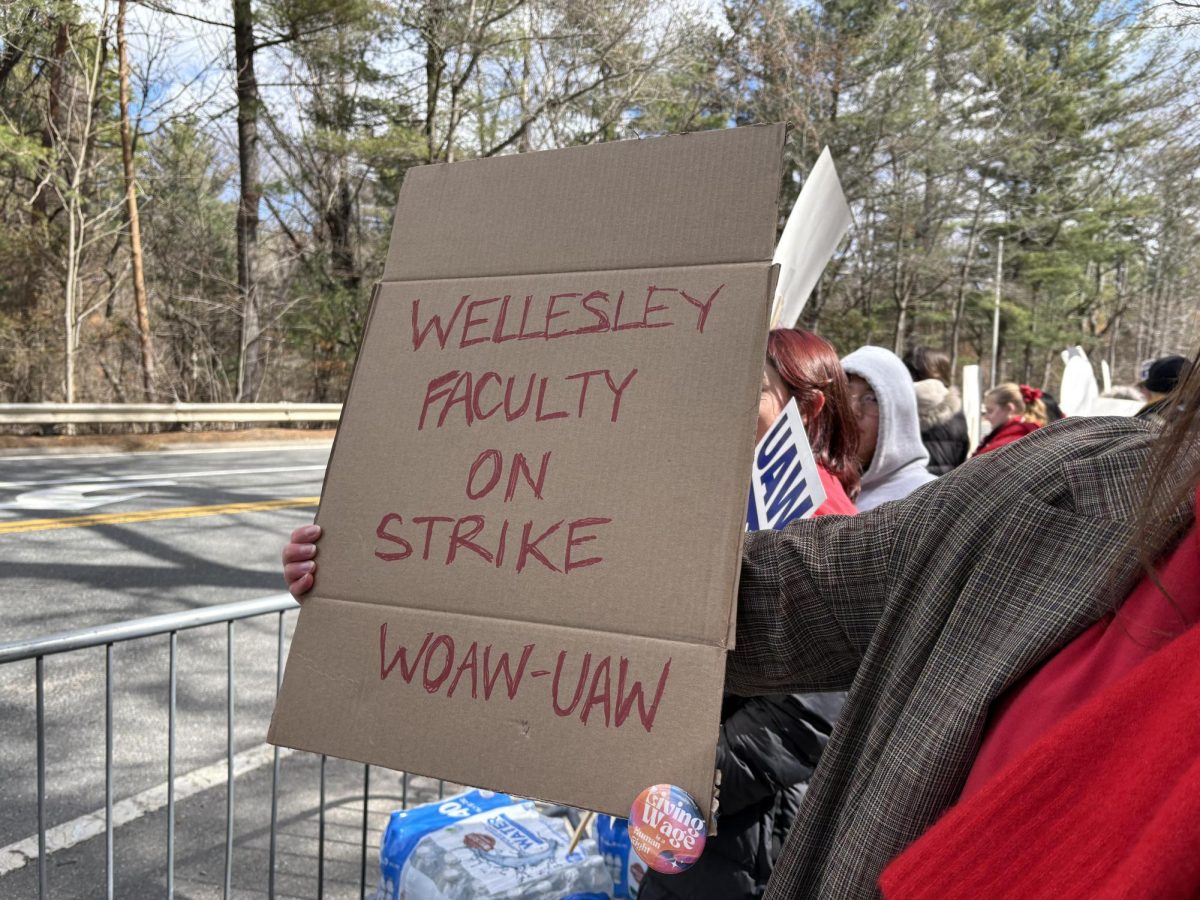Amidst red, white and blue balloons and an almost palpable excitement, students gathered in Pendleton Atrium to stream the live results from the midterm elections yesterday. Senators and representatives all over the country had been working hard to win the quadrennial elections, and Wellesley students had been doing the same to encourage students to vote and get involved in the election.
The Committee for Political and Legislative Awareness (CPLA), Wellesley’s non-partisan political committee in College Government, partnered with the Wilson Fund, Knapp Social Center, Wellesley College Democrats, Wellesley College Republicans and the Schneider Board of Governors to host an election night party last night. Around 150 students convened on Nov. 4 with boxes of pizza to watch the news in anticipation for the election results.
“This night is not necessarily for the results, but how Wellesley [students] can watch together and take a night from to homework to foster bipartisan dialogue and have fun,” Hannah Flesch ’16 said.
Others feel that this sense of community was not always present at Wellesley’s political functions.
“In 2012, [the election party] was on a little bigger scale, [but] it was very one sided,” Allie Carbonaro ’16 said.
This year, students joined together to watch broadcasts from Fox News and MSNBC.
“There is definitely a lot of excitement; people have been talking about [the election] for the past two weeks,” Julia Tazartes ’18 said. “I think it’s really nice how they created this environment for everyone to look at the election.”
Throughout the night, students ardently debated over state predictions.
“In France, you don’t really talk about elections between people, and this is really cool because people talk about it it a lot and experience it together,” Yasmine Akhavan ’18, an exchange student, said.
On the other hand, students such as Imara McMillan ’17 felt that the excitement at Wellesley was lacking.
“I feel like its a very muted level, which doesn’t surprise me, since there’s a lot of people voting absentee,” McMillan reflected. “I’m curious to see how this election will compare to 2016, because it has been relatively quiet even in a politically active campus.”
Throughout the semester, CPLA has been helping studnets to register to vote. CPLA hosted voter registration drives, where representatives the organization helped students complete voting registration forms or apply for absentee ballots.
Additionally this year, CPLA introduced TurboVote, an online tool, as an alternative way to register to vote. The Office of the Dean of Students decided to purchase TurboVote due to a grant from a partnership between TurboVote and Student Affairs Professionals in Higher Education. TurboVote allows students to receive email or text reminders about election deadlines as part of an effort to increase voter turnout. CPLA is using this year as a test run for TurboVote to see if Wellesley College students utilize the tool or prefer traditional voter registration drives. This year, approximately 60 students came to CPLA’s in-person registration table and about 75 people used Turbovote.
CPLA has also co-sponsored two panels with Wellesley’s political science and economics departments, one about foreign policy and another about the probability of Democratic or Republican control of the Senate in the midterm elections. CPLA also held an absentee ballot party, hosted a political television night and various other events to promote political awareness and foster civic engagement on campus. Last Monday, Wellesley College Democrats invited Congressman Joe Kennedy and Governor Deval Patrick to campus to speak about the importance of youth activism and voting.
Several students on campus also served as interns for candidates’ campaigns prior to the midterm election, including for Republican candidate Charlie Baker and Democratic candidate Martha Coakley, who ran against each other for governor of Massachusetts.
“I’m just doing my part in the run-up to the election,” says Alexis Zhang ’17, who interned for Charlie Baker’s campaign this semester. As an intern, she had a wide array of duties, including stuffing envelopes, making recruitment calls, training volunteers, staffing events and helping with election day operations.
On Nov. 4, Charlie Baker was elected the Governor of Massachusetts.
“He wants to focus on growing the economy, and he cares about improving educational opportunities for everyone,” said Reba Meserve ’16, president of the Wellesley College Republicans.
It was announced close to midnight after most votes had been tallied that the Republicans gained control of the Senate.
“The next two years might be a huge power play for Republicans in the Congress because they will be able to effectively blockade all liberal efforts that are made by the President and create an even more unpopular presidential term for Obama,” Alice Lee ’18 predicted. “On the other side, it doesn’t look too bleak for the Democrats because in the 2016 presidential election, further gridlock that is majority Republican will reflect poorly.”
Throughout the semester both Wellesley College Democrats and Republicans strove to influence students in the election. Both organizations went door-to-door in the town of Wellesley to reach out to voters in the community and held phone banks to remind voters to get to the polls. Both organizations also have campaigned to promote their candidates and increase the low voter turnout that often plagues midterm elections.
“I’d argue that midterm elections matter just as much though, because of this low turnout. If not as many people are voting, your own vote counts even more,” CPLA Chair Beth Feldstein ’15 said.
Many campaign workers are interns and volunteers who are often college students who have fewer commitments, such as full-time jobs or families, than older generations.
“We had a really dedicated group of volunteers this election season,” Chase reflected.
Campaigning work is a significant time commitment, and college students have to balance a hectic student schedule with efforts for the election. Chase recounted times spent phone banking instead of writing a paper that was due the next day.
“But I remind myself that if I don’t participate in the election, then I have no right to complain about the outcome,” Chase said. “If young people like me don’t do the work, who will?”
Photo by Soojin Jeong ’17, Photography Editor






